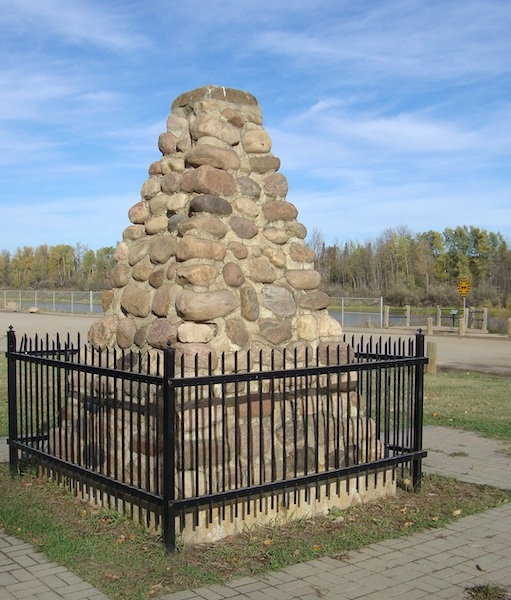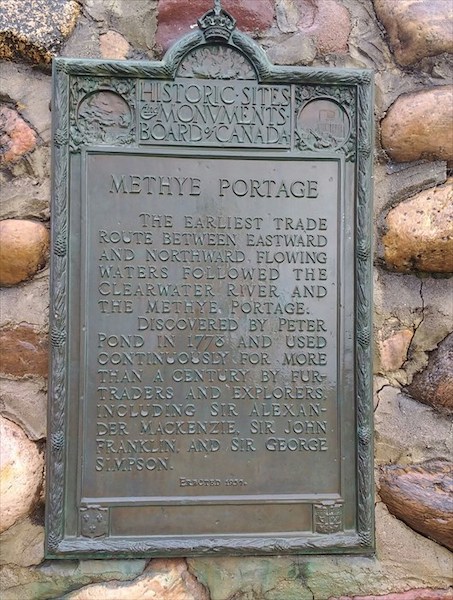Flood Damage
I've had May 26 photos of flood damage to the PP cairn at Fort McMurray sent to me, taken by PPSer Blair Jean. You can see it's been just about cut in half. The first photo shows damage to the cairn with the subsided Clearwater River in the background. Then there's the plaque which also came off, the cairn before damage, then the plaque still on the cairn. I believe the cairn was installed in the 1930's so there has been time for cracks to form within. I always liked seeing PP's name preceding those of Mackenzie, Simpson and Franklin who also used Methye Portage, three other giants of northwest exploration.
Following this are items that have come in over previous months but are not necessarily related to whom I have also called Peter Pond the Elder (PPE).
The first deals with a man with the last name of Pond who lived in Michigan in the 1850's. I have pretty good evidence he is descended from PPE and a "country wife." I have a genealogy chart that shows this which has been sent out before. But if anyone wants to see it now, please ask. So please read below the May 9 email I received from new PPSer Larry Hennessey of Okemos, MI plus a short article about Augustus Pond winning a famous court trial.
Dear Mr. McDonald:
I contacted you a couple of years ago to investigate whether or not my 4th great grandfather, Augustinius Peter Pond, was indeed the son of Peter Pond as his death certificate indicated. If so, he was not likely the son of his wife Sussana Newell, but rather, as one distant relative put it, of a "country wife". Augustinius' connection to Peter Pond is suggested by his marriage to Marie Boucher, the daughter of Francois Boucher, who was a Northwest Company trader and interpreter famously involved in the Battle of 7 Oaks near Ft. Douglas during the Pemmican War. I have attached a copy of some pages from Hudson Bay Company's official record of that event, obtained from the Historical Society of Alberta. Boucher is also referenced in the 1805 diary of NW Company trader Thomas Connor, which I suspect that you have, as it is one of the diaries in the collection, "Five Fur Traders of the Northwest" that includes the fragment of Peter Pond's memoir.
Augustinius' son, Augustus Pond, was a fisherman and the younger brother of my 3rd great-grandmother, Rachel (Pond) St. Andre. He was involved in a notorious event in the late 1850's that ended up setting a legal precedent that stands to this day and has served in some ways as the basis for "Stand Your Ground" legislation. He was tried and convicted of murder, but the sentence was eventually overturned on the grounds that he had the right to defend his property and employees, with deadly force if necessary. The 1860 census shows that he was an inmate of Jackson State Prison in southern Michigan at the time. Interesting that his grandfather had also been tried for murder and acquitted on the basis of self-defense..... I have attached a copy of an article from Michigan History Magazine about the incident.
I am considering preparing an article for MI History Magazine about Peter Pond's Michigan connections, mainly highlighting his involvement in the 1776 Mackinac Island peace conference, to which he conveyed the Chippewa chief.
Thank you for the Peter Pond Society newsletters. My wife is from Hamden, CT, and we occasionally visit relatives there. Perhaps I may be able to meet you in person some day.
Thanks again,
-Larry Hennessey, Okemos, MI
Pond v. The People: Michigan sets a legal precedent
Author: Larry Peterson
Date: March-April 2011
From: Michigan History Magazine (Vol. 95, Issue 2)
Historical Society of Michigan
Just before dawn on June 18, 1859, the usually tranquil community at Seul Choix Point on Lake Michigan's northern shore was transformed into a murder scene. A fisherman lay dead--killed by his neighbor. The culprit was quickly apprehended and handed over to the authorities for trial. When a jury found the defendant guilty, the case was appealed to the Michigan Supreme Court. The court's landmark ruling established a precedent for the state and the nation.
In the 1850s, the village at Seul Choix--east of what is now Manistique--teemed with activity. The primitive dwellings of a large community of fishermen lined the narrow rocky shore. The men were drawn to the clear blue water off the point, which offered a rich harvest of whitefish and lake trout.
Augustus Pond and his family traveled 75 miles from Mackinac Island by rowboat to engage in commercial fishing at Seul Choix. Pond, age 34, was a quiet family man. He resided at Seul Choix with his wife and their three young children, including a 12-year-old daughter, a five-year-old son, and a new baby boy.
Pond's humble home measured 16 square feet. It was a one-room, rough-hewn shanty with a bark roof, a window, and a door. The door opened outward and was attached to the hut with leather straps used as hinges. It was secured by an attached rope tied around a pin inside the building.
Pond also had one outbuilding: a net house that stood about 30 feet from his front door. This building was slightly smaller than his shanty but of similar construction. Six posts were set in the ground and enclosed with one-inch boards nailed to the timbers. The roof was fashioned using poles and bark slabs. The building was floored with boards. A door faced Pond's hut and was held in place with the same hinge-and-rope method. A sleeping berth that would accommodate two people comfortably was constructed on the wall opposite the door.
Pond hired two men, Daniel Whitney and Dennis Cull, to assist him in his fishing operations. These employees ate their meals with the family in the shanty, but slept at night in the net house.
Dozens of fishermen from St. Ignace, Mackinac Island, and Beaver Island spent their summers fishing commercially at Seul Choix. Among them were David Plant, Joseph Robilliard, and Isaac Blanchard Jr. Plant was a natural-born leader. He also was a heavy drinker and a bully. Robilliard was his constant companion. Isaac Blanchard Jr., age 22, was the youngest member of the group. Blanchard was a giant of a man who stood 6 feet, 7 inches tall and weighed more than 240 pounds. His superhuman feats of strength were legendary throughout the Eastern Upper Peninsula. Blanchard's father was a pioneer resident of Mackinac County and an influential justice of the peace on Mackinac Island.
Plant, the leader of the group, developed an intense and unexplained dislike for the passive Pond. At around noon on Thursday, June 16, 1859, Pond's daughter Mary strolled along the shore and passed near the home of the Downey family. She overheard Plant and Blanchard talking with Mrs. Downey. Plant, in a loud voice, threatened to whip Augustus Pond. Mary rushed home to tell her parents.
That evening Plant, Robilliard, and Blanchard went hunting for Pond. A gang of young ruffians followed along to watch. They found Pond at the home of Joseph Martell. Plant called for Pond to come outside. As soon as he emerged from the home, the men surrounded him. Plant tried to bait Pond into a fistfight. He accused him of abusing his neighbors. When Pond remained silent, Plant punched him in the face, knocking off his hat. Then he kicked him in the chest. Pond's only reaction was to retrieve his hat and place it back on his head.
Blanchard carried a bottle of whiskey that he then shared with the others. While his tormentors drank, Pond took the first opportunity to run away into the woods.
Later that same evening around 10 o'clock, the three men searched for Pond again and the mob followed along. They arrived at Pond's net house where his two hired men slept inside. The door was closed and secured with a rope. The men tore the door from its leather hinges, and Plant entered the net house while Blanchard and Robilliard waited outside. Whitney and Cull were heavy sleepers and did not awaken until they heard the sound of Plant's footsteps on the floor. Plant grabbed Whitney by the arm, discovered he had the wrong man, and left the net house headed for Augustus Pond's shanty. Arriving at the threshold, Plant opened the unsecured door and walked into the home uninvited. Pond's terrified wife Mary and their children cowered inside.
"Where is Gust Pond?" Plant demanded. Mary told him to check her husband's boat. But the three men had already been there and come up empty-handed.
Plant told Mary he had business with her husband, but refused to explain further. After the three left, Pond returned home undetected. He stayed for only five minutes before leaving again to spend the night with his neighbor, Joseph Martell.
The following day, Pond did what he could to avoid going back to his home. He stopped by the Martells in the morning to pick up his pistol, which he said he would give to his hired men. Around noon of the same day, Pond came across Plant and Blanchard near the home of fellow fisherman Peter Closs. Plant started harassing Pond again, and was overheard making threats to harm him. Pond remained silent in response to these threats and slipped quietly away. Plant walked over to the dock and told those present that he must whip Augustus Pond, or be called the world's biggest loafer.
On Friday evening, a nearly full moon illuminated the lakeshore. Pond's hired men, Whitney and Cull, repaired the door to the net house and went to bed around 10 p.m. Plant, Robilliard, and Blanchard spent most of the evening drinking aboard their boat. They finally came ashore around 11 p.m. No one fell asleep in the home of Augustus Pond, for they feared that Plant and his friends would return.
About 1 a.m. on Saturday, Plant, Robilliard, and Blanchard went to the net house where Whitney and Cull slept. Whitney was awakened by the creaking of boards being pried off the roof directly over his head. Cull continued sleeping. The three men had dismantled the west wall of the net-house and a portion of the roof. After Whitney woke up, the men stopped what they were doing and headed for Pond's front door. Plant grabbed the door and started shaking it. He demanded that someone open it. He wanted to see the master of the house. Pond's wife said that her husband was not inside, though Pond was hidden under the bed. Plant started shaking the door again. "Open the door!" he cried. "We want to search the house."
"I told you he is not here," Mary replied.
Plant used several ploys to gain entrance into the shanty, but Pond's wife steadfastly refused to admit him. The three men finally went away.
Pond took the opportunity to hurry over to the nearby home of his brother-in-law. There he obtained a double-barreled shotgun loaded with pigeon shot. He returned about 15 minutes later with the gun. After briefly inspecting the damage to the net house, Pond went back inside his home. Whitney did not go back to bed, but instead walked toward the home of Thomas Ward. Pond's other hired man remained asleep in the net house.
Plant, Robilliard, and Blanchard were already at the home of Thomas Ward and were drinking and making a ruckus. Plant woke up the entire household even after being told there was a sick child inside. Ward came outside to talk to Plant and keep the peace. Plant proceeded to tell Ward about tearing down Pond's net house, and asked Ward to join them. He told Ward they were going back to finish the job, to "whip [Pond] or even have his soul out of him." Ward refused to be part of it.
Defeated but not discouraged, the drunken fishermen arrived back at the Pond family shanty. They asked to come inside, but Pond's wife continued to refuse them entry and had secured the door with the rope. In frustration, the men turned their attention to the net house. As Robilliard and Blanchard began ripping off more boards, Plant stepped inside where Cull was still sleeping soundly, pulled the hired man out of bed, and began choking him. Cull managed to cry out as he struggled to free himself. Pond heard the commotion and came out of his home armed with a shotgun.
"Who is tearing down my net house?" he shouted.
The only response was the screeching of boards as they were being ripped away from the building. "Leave or I'll shoot," he threatened, as more boards were torn loose. Thirty seconds passed.
"Leave or I'll shoot," Pond yelled again. ]here was no answer except the voice of Dennis Cull as he cried out in pain from inside the net house. Pond then discharged his weapon, just as dawn broke over the village.
The body of Isaac Blanchard Jr. was found shortly after sunrise in the woods about 210 yards from Pond's shanty. The strongman ran there before death overtook him. The mortal wound was inflicted by the burst of pigeon shot from Pond's gun: just one barrel's worth.
In the aftermath of the shooting, Pond first went to see his brother Louis, who was a constable. But Louis refused to get involved. Pond wanted to turn himself into the authorities on Beaver Island about 25 miles away, where Blanchard's father would have less influence. Whitney and Cull accompanied their employer and helped row the boat. When they were within seven miles of Beaver Island, they were stopped by another craft from Seul Choix. Pond was taken aboard that vessel and returned to the fishing village. From there, he was transported to Mackinac Island as a prisoner.
His trial was held two months later. Pond's attorney argued that the homicide was justifiable to defend his home against a felonious assault. The district judge rejected the defense theory in his instructions to the jury. As a result, Pond was convicted of manslaughter and sentenced to 10 years of hard labor at the state prison in Jackson.
Pond's attorney immediately appealed the case to the Michigan Supreme Court. The court found that the jury had been given incorrect instructions regarding justifiable homicide and self-defense. The landmark ruling came on May 19, 1860. It read in part:
"The guilt of the accused must depend on the circumstances as they appear to him, and he will not be held responsible for a knowledge of the facts, unless his ignorance arises from fault or negligence."
"A man assaulted in his dwelling is not obliged to retreat, but may use such means as are absolutely necessary to repel the assailant from his house, or prevent his forcible entry, even to the taking of life. And if the assault or breaking is felonious, the homicide becomes at common law justifiable and not merely excusable."
Pond had acted to prevent the destruction of his home and to save the life of his employee. A new trial was ordered and Pond was eventually set free. He died four years later and was buried in St. Ignace.
Though dead now for nearly 150 years, Augustus Pond's name lives on in the legal decision that continues to be upheld in Michigan and across the nation.
Larry Peterson is a Schoolcraft County native. He has spent more than 30 years in the field of social work, but his greatest love is exploring 19th-century local history. He thanks Marilyn Fischer of the Gulliver Historical Society and Lee Ekblad for their assistance in gathering information for this article.
###
Finally I have links from articles related to the man I call Peter Pond the Younger (PPY, 1933-2000). I like mentioning him since he too had an adventurous life as did his colorful ancestor. He was a missionary in Cambodia among the Khmer Rouge and the vicious Pol Pot regime. He was shot once for his trouble and while there he adopted 21 Cambodian orphans as a way to save their lives.
His most famous adoptee was Arn Chorn-Pond (1966- ) who is written up in Wikepedia. Arn Chorn had a young adult novel written about his harrowing early life entitled "Never Fall Down" by Patricia McCormick, discussed in a New York Times article. There is also a gripping 16-page NYT article by best-selling author Gail Sheehy about the difficulties Arn Chorn and his other adoptees went through when brought to rural New Hampshire in the USA by PPY.
These don't directly apply to PPE, but I think you will find them worthwhile reading.
 Peter Pond Cairn
Peter Pond Cairn
 Methye Portage Plaque
Methye Portage Plaque
 Peter Pond Monument intact
Peter Pond Monument intact
 Metheye Portage plaque Ft Mac
Metheye Portage plaque Ft Mac